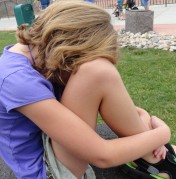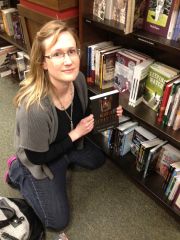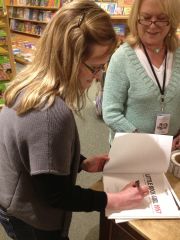I love guest posts, not just because they give my weary fingers a break, but because other writers make me see the craft in new ways.
So today I present Kirstin Cronn-Mills, one of the founders of my writing group and a person with amazing intuition. She’s taught me about energy and inner peace, which are good to have when the writing world beats you down. She’s written two young adult novels, The Sky Always Hears Me and the Hills Don’t Mind, a Minnesota Book Award nominee, and Beautiful Music for Ugly Children, which was nominated for a Lambda Award.
Beautiful Music synopsis: Gabe is a guy with big summer plans. He’s got a job as a radio DJ,  following in the footsteps of his mentor, and he wants to move after graduation. He’s also hoping his best friend Paige will fall in love with him—she’s smart, she’s hot, and she tolerates his music habit. He couldn’t ask for more. His only problem? The rest of the world has known him as Elizabeth for the last eighteen years.
following in the footsteps of his mentor, and he wants to move after graduation. He’s also hoping his best friend Paige will fall in love with him—she’s smart, she’s hot, and she tolerates his music habit. He couldn’t ask for more. His only problem? The rest of the world has known him as Elizabeth for the last eighteen years.
Beautiful Music went through several major revisions. Did you love the book more each time?
Kirstin: That’s a very interesting question, and not one I’ve thought about! I’ve always been unreasonably in love with Gabe & John—and I really loved my story line when John was actually Elvis, as in faked-his-death Elvis, because that was a wonderful thing to imagine. But then Elvis took over the book, so we had to let that part of John go, and I was sad. Did I love it more each revision? I had a new appreciation for it after each revision, especially after incorporating my editor’s suggestions. He made the book into something even better.
You could face controversy because you’re a hetero woman – and a married one – writing about a trans man. How has the trans community responded? How about conservative readers?
It doesn’t much matter that I’m hetero, but it does matter that I’m cisgender (my body and brain match up). Some people have questioned it, but not as many as I’d expected. I’ve gotten very kind comments from trans* men about how they’re grateful to see themselves in a book, and how it’s the first time it’s happened for them. That’s the kind of stuff that makes me infinitely happy. I’m not sure any conservatives have read the book. : ) I haven’t seen any comments to that effect, anyway.
People have objected to things in the book that I haven’t expected. One review group thought I was being misogynistic because Gabe was tokenizing women, and that comment surprised me. But I also understand it, because Gabe does spend a lot of time looking at women and thinking about them. However, if you’re new to allowing yourself to be a guy in public, and you’re new to allowing yourself to think like a guy, I’d think there might be a lot of staring at women going on. Gabe’s a hetero dude. He’s going to look.
John is my favorite character. (John is Gabe’s friend and mentor, a former DJ who first played Elvis on the radio.) John didn’t make an appearance until the second or third draft. Why did you decide John needed to be part of this story?
After the book came out, I realized that one of my goals with BEAUTIFUL MUSIC was to create allies for the trans* community. John matters to the story because he’s Gabe’s constant, unshakable ally. Everybody needs a champion like that, especially someone who’s just emerging as his true self.
Clearly you’re a music fan with eclectic tastes. The radio station in Beautiful Music is the most important setting, in my opinion. Is music as important to you as books? Did you ever consider a radio job?
I would have loved a radio job! I’m still in love with radio when it has personality and real people behind the mic—those stations are few and far between, these days, but they’re still there. I wanted Gabe to have an opportunity to share his musical passions, and a tiny little radio station was one place that would allow it.
Music might be more important than books, for me. There are books everywhere, and they’re easily acquired. Music, to me, is more intimate and personal, and more emotional. Music matters to my state of mind. Books aren’t quite like that.
You’re a prolific writer despite having a family and full-time job teaching college. And there’s no such thing as full-time teaching – it’s more like a job and a half. How do you make it work?
I don’t—not very well, anyway. I never have enough time to write, which is why it’s taken 7 years from idea to shelf for each book. : ) Maybe, once my child is out of the house, I can shorten that time frame! Family matters most to me, then job (because it has to matter), then writing. That formula needs to remain as is for a while.
We’ve been in a critique group together for about 10 years. In your opinion, what’s the good, the bad, and the ugly in a critique group?
I can honestly say that our critique group is directly responsible for my first book—without your encouragement, I wouldn’t have even had the guts to try and complete a novel. The input from everyone is extremely valuable—we have so many smart people in our group! And I’m trying, but I can’t think of a bad or an ugly! Well, I guess it’s bad when people move away. : (
What do you like to read? Tell us some of your favorites, all time or recent.
That’s a very, very hard question for me. I appreciate contemporary realism more than anything. I’m not much of a fantasy fan—I like magic realism, but I really dislike dystopia (I realize nobody admits that, but I’ll be the first). Some favorites: the Harry Potter series, American Gods (a grown-up novel by Neil Gaiman), anything by A. S. King (YA), and OF COURSE all the books our writer’s group has produced!
What’s next?
I’m working on an illustrated YA novel with a graphic artist from Minneapolis. The main elements? Sibling rivalry and street art.
You can learn more about Kirstin and her work on her web site.















